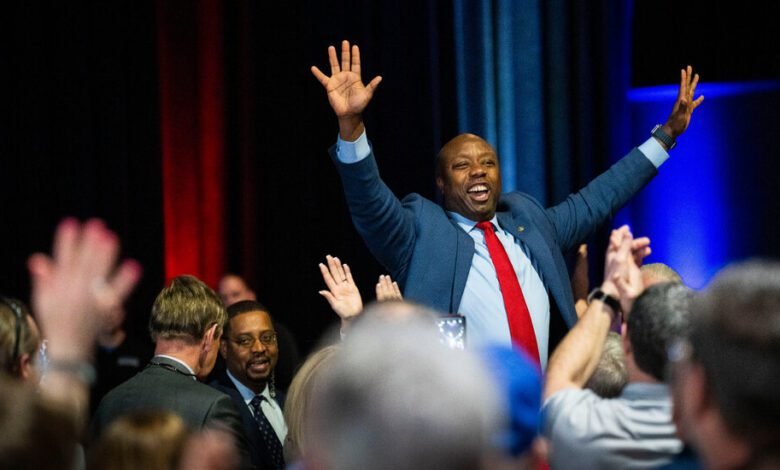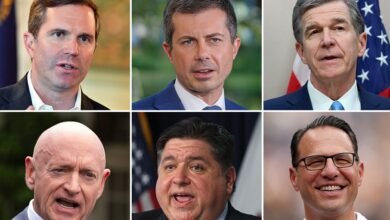Tim Scott’s fundraiser includes Trump-resistant donors as VP race heats up

Senator Tim Scott of South Carolina, a leading candidate to become Donald J. Trump’s running mate, will host a meeting in Washington next month with the participation of Republican donors who have so far remained publicly uncommitted to the presidential ticket of the party.
Billed as a meeting of Great Opportunity Policy, a tax-exempt group that supports Scott’s political agenda, the private event on June 19 will also serve as a fundraiser, at a time when Trump’s quest for vice-presidency starts to heat up. .
A show of financial strength for Scott’s group could boost his chances of being selected by Trump, who has spoken with advisers at Mar-a-Lago about which potential running mates could help the campaign raise money. For Scott, the event could help signal that he is a more palatable political figure to centrist donors and that adding him to the ticket could expand the network of financial resources that Trump could tap this year.
According to a copy of the invitation obtained by The New York Times, Mr. Scott’s event will feature remarks from several major donors and other well-known figures:
-
Marc Andreessen, the software engineer turned investor who has donated more than $11 million to non-Trump political causes this cycle
-
Kenneth Griffin, the founder of the Citadel hedge fund, has made nearly $60 million in political contributions this cycle, many of which helped fund Trump’s Republican primary opponents.
-
Marc Rowan, chief executive of Apollo Global Management, who supported Scott’s presidential bid
-
Bill Ackman, founder of Pershing Square Capital Management, who said he was deciding whether to support Trump or Robert F. Kennedy Jr., an independent presidential candidate
-
Tim Dunn, founder of CrownQuest, who previously supported Trump with a $5 million contribution to Make America Great Again Inc., the former president’s super PAC
-
Kellyanne Conway, former Trump White House senior adviser
Trump is increasingly concerned about a range of financial problems. During the campaign, his advisers hope to be defeated by President Biden’s fundraising operation. In court, his four criminal cases led to sky-high bills, sapping about $50 million from his Save America political action committee last year.
The former president responded by leaning on his own fundraising efforts — a stark change from his first campaign in 2016, when he appealed to voters by portraying political donors as a malign force undermining the interests of working-class Americans.
At a private fundraiser Saturday at his Mar-a-Lago club in South Florida, Trump told donors they wouldn’t get a photo with him if “you don’t pay enough,” and added that he occasionally told his aides scheduled a lot of photos before an event.
“They said, ‘Well, they’re paying $100,000 each for a photo’ — I say, ‘OK, I’ll do it,’” Trump said, to applause from donors, according to a recording of the event.
A large group of Republican officials participated in the event, including Scott, who the former president highlighted to the crowd as an “unbelievable” pro-Trump replacement.
Scott, the only black Republican in the Senate, has also been actively helping Trump raise money. This year, he helped organize a major fundraiser ahead of a key presidential primary contest in his home state.
Later this month, Scott is expected to attend a fundraiser in Manhattan organized by a group of billionaires, financial executives and longtime Republican donors, according to a person familiar with the planning who insisted on anonymity to discuss the private deliberations. Hosts for this event include Howard Lutnick, chief executive of investment firm Cantor Fitzgerald; John Paulson, a hedge fund billionaire who hosted an event for Trump last month in Palm Beach, Florida; and J. Pepe Fanjul, senior executive at Florida Crystals, as per invitation.
The Washington policy meeting hosted by Scott next month, which seeks contributions of up to $250,000 from attendees, is expected to focus on anti-Semitism on college campuses and financial issues.
In a statement, Scott said the topics would aim to “expand opportunities and access to the American Dream.”
“For many Americans, prosperity is out of reach,” he said.
Maggie Haberman contributed reports.




